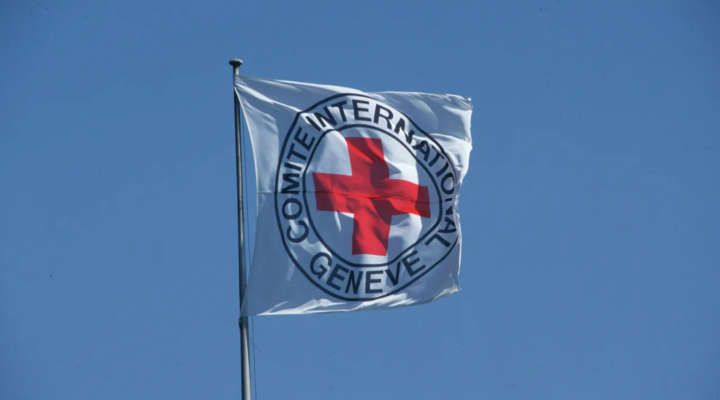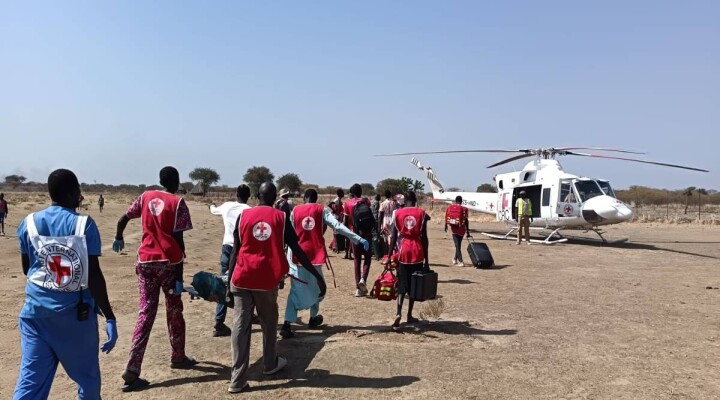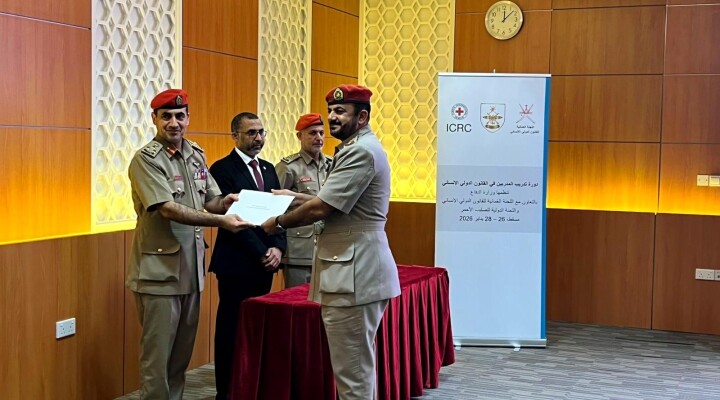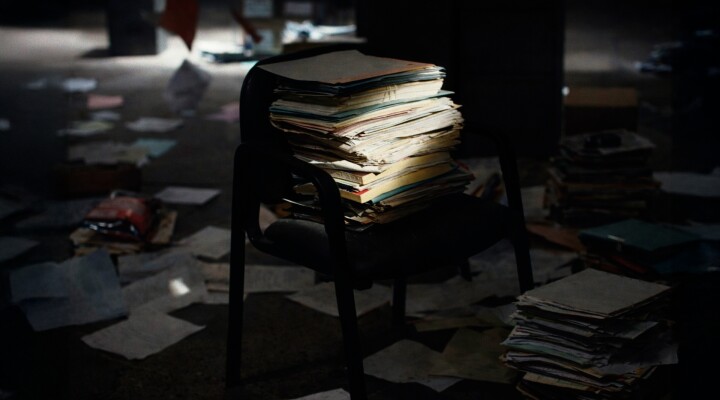COVID-19: The Middle East is facing health crisis and socio-economic earthquake
Conflict-hit countries need urgent support to stem the spread of COVID-19 and prepare for a potentially devastating aftermath, the International Committee of the Red Cross’ Near and Middle East Director Fabrizio Carboni says:
“The Middle East is today facing the twin threats of potential mass virus outbreaks in conflict zones and looming socio-economic upheaval. Both crises could have severe humanitarian consequences.
The COVID-19 pandemic threatens to be a global socio-economic earthquake. It will be felt acutely in the region’s conflict zones, where millions are already coping with little or no healthcare, food, water and electricity, lost livelihoods, rising prices and destroyed infrastructure.
Deep humanitarian needs will worsen and new ones will emerge if the international community doesn’t factor socio-economic aftershocks into our response. Authorities and local responders must be supported now to ensure people’s lives, livelihoods and food security are protected later.
Much-needed public health measures like lockdowns and curfews already make it difficult or impossible for many people to provide for themselves and their families. Small shops are shuttered. Cafes sit empty. Street vendors have lost their passing trade. The switch to online working could see many left behind. Over time, levels of hunger, malnutrition and chronic illness and stress linked to economic problems could soar.
Across the Middle East, many people are already living a hand-to-mouth existence, struggling to survive and rebuild their lives against vast odds. In Syria, seeing children the same age as my own playing in camps is a humbling experience. They are some of the millions of people we help access clean water every day. In Iraq, mothers and widows told me what our support for their small businesses meant to their families. Such support will be more important than ever in the coming months as we face this pandemic together.
With our Red Cross Red Crescent partners, we are doing our best to help the region’s most vulnerable people and bolster efforts to prevent the spread of the virus. In Yemen, our life-saving support to hospitals, clinics and dialysis centres now includes help with their COVID-19 prevention preparations. In Syria and Iraq, we are helping prisons with their anti-infection measures. Water trucking support to camps, displacement shelters and places of detention ensures people have clean water to wash in. Hygiene kits for displaced people and detainees include soap and shampoo.
More broadly, our water and sanitation services, energy provision, food and household distributions and micro-economic initiatives need to continue and increase where possible, reinforcing support to fragile systems and serving basic needs that may be overshadowed in the pandemic. Right now in Yemen, we have teams out on field trips registering people who need aid. Across the region, we want to increase our support in coming months, especially to people who may be particularly affected like low-income workers, women heading households, farmers and people with disabilities.
We’ve changed the way we work to keep staff and the people we help safe, using physical distancing during distributions, wearing protective equipment and changing how certain aid and cash transfers are delivered, for example. We will continue to adapt and to innovate. We will increase our assistance to the people who need it most, working with our Red Cross Red Crescent partners and the tens of thousands of volunteers who go out every day to help their communities across the Middle East, through the pandemic and beyond it.”
Examples of ICRC’s COVID-19 response in the Middle East
Syria: Donating hygiene kits for detainees, as well as preventative equipment and materials like disinfectant, gloves, goggles and gowns to central prisons under the Ministry of Interior; preventative measures in the ICRC-Syrian Arab Red Crescent field hospital in Al Hol camp; hygiene kits to reach 750,000 internally displaced people over next three months.
Iraq: Donating protective equipment and materials like disinfectant, gloves, goggles, gowns to health facilities and places of detention across the country. To date, donated to 18 primary health care centres, two hospitals and 15 physical rehabilitation centres, as well as 27 places of detention housing more than 45,000 detainees.
Yemen: Training, preventive information and material distributed to supported hospitals, primary health care centres and dialysis centers, alongside ongoing support to these facilities; public information campaign including audio spots on COVID prevention measures.
Gaza: Donated 20,000 masks and other protective materials to Palestinian Red Crescent Society; supporting authorities’ quarantine efforts with donations of blankets, mattresses and hygiene kits. Supplying infrared thermometers to screen suspected cases and other medical equipment.
Lebanon: Supporting the main COVID-19 testing and treatment facility in country, Rafic Hariri University Hospital, to boost response and bed capacity; working with detaining authorities in Roumieh prison to upgrade facilities and set up isolation block for suspected and confirmed cases.
Jordan: Provided hygiene and protective equipment for places of detention and correctional facilities; cash transfer programmes for Syrian refugees continues with preventative measures.
Iran: The ICRC has donated CHF 500,000 to the Iranian Red Crescent Society, which is leading the response to and providing services in several areas including disinfection of prisons, screening and treatment of patients, public information campaigns and livelihood support to affected vulnerable people.
Existing Humanitarian needs and ICRC response in Middle East
· Half of all medical facilities in Syria and Yemen are not functioning.
· Three of ICRC’s five biggest humanitarian operations in 2019 were in Middle East – Syria, Yemen and Iraq
· In these three countries alone, almost 40 million people need humanitarian aid
· ICRC provides water and sanitation support to authorities across the region – Syria, Yemen, Iraq, Jordan, Gaza and the West Bank and Lebanon
· ICRC’s provided food assistance to more than two million people in the Middle East in 2019.
For further information, please contact:
Ingy Sedky, ICRC Syria spokesperson, +201005770750, isedky@icrc.org
Yara Khaweja, ICRC Yemen spokesperson, +961 70 661 374, ykhaweja@icrc.org
Sahar Tawfeeq Sulaiman, ICRC Iraq spokesperson, +964 7901916927, sessa@icrc.org
Rona Halabi, ICRC Lebanon Spokesperson, +96170153928, rhalabi@icrc.org
Suhair Zakkout, ICRC Gaza spokesperson, tel: +972 59 92 55 381, szakkout@icrc.org
Sarah Alzawqari, ICRC Middle East spokesperson, +961 3138 353, salzawqari@icrc.org
Ruth Hetherington, ICRC Middle East spokesperson, +41 79 447 3726, rhetherington@icrc.org
Matt Morris, ICRC London Head of Communications, +44 7753 809471, mmorris@icrc.org
SHOTLIST
Location: Various across Middle East
Length: 06:55
Format: HD, mp4, 1.05 GB
Camera: Various
Filming date: Various
On-screen credit: ICRC
Access all
20200416-MiddleEast-COVID19
LOGLIST
00:00 Distribution of food to displaced people with COVID-19 preventative measures, Dammaj, Sa’ada province, Yemen, April 2020
00:34 Delivering hygiene kits and medical material to Palestine Red Crescent Society, Gaza, April 2020
00:55 Soundbite: Eve Charbonneau, Health Coordinator, ICRC, Iraq, April 2020, “If I base this on my previous experience of prevention, control of infectious diseases, or my Ebola experience last year… the importance is the way you give information to the population, so they are aware of what the virus is, how to prevent getting the virus, and if they do, what to do when they get it, and how to deal with it”.
01:18 GVs of tents in Al Hol Camp, Syria
01:31 Field hospital run by ICRC and Syrian Arab Red Crescent showing measures put in place to protect patients and staff from spread of COVID-19, Al Hol Camp, Syria, April 2020
02:09 Bore hole installed at Sana’a Central Prison, Sana’a, Yemen, April 2020
02:20 ICRC delivery of personal protective equipment, Tasfirat Prison, Najaf Province, Iraq, April 2020
02:32 Soundbite Robert Hollander, ICRC Prison System Adviser, Iraq, “Detainees are extremely vulnerable – they have often, they live in close proximity among each other. It’s well known that infectious diseases can harm the detainee population very much. That’s why we are extremely concerned. Often water is not always available or accessible, and it means that for detainees it will be very difficult for social distancing.”
03.05 General shots of Distribution of food and hygiene kits, Sinjar, Iraq, March 2020
03:32 General shots of Children collecting water Al Hol Camp, Syria, February 2019
03:52 General shots of Physical Rehabilitation Centre, Aleppo, Syria, March 2020
04:16 Imad Munaif showing ICRC colleague around the destroyed home he has come home to rebuild, Baiji, Saladin governorate, Iraq, 2019
05:07 Distribution of water by water truck by Syrian Arab Red Crescent and ICRC, Hasakah, Syria, October 2019
05:29 Boys begging and working in the streets, Aden, Yemen, 2019
05:52 Mutafa at his restaurant that he set up with a grant from the ICRC, Mosul, Iraq, 2019 Om Hassan at her hairdressing salon, set up with support from the ICRC and the Syrian Arab Red Crescent
06:25 Maha at a tailoring workshop paid for with an ICRC grant, Hamah, Syria, 2019
06:55 ENDS



